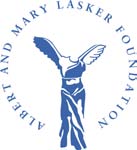On September 10, The Lasker Foundation announced the winners of its 2019 Lasker Awards: Max D. Cooper, MD, of Emory University, and Jacques Miller, AC, FRS, FAA, of the Walter and Eliza Hall Institute of Medical Research, will receive the Albert Lasker Basic Medical Research Award; H. Michael Shepard, PhD, formerly of Genentech, Dennis J. Slamon, MD, PhD, of the University of California, Los Angeles, and Axel Ullrich, PhD, of he Max Planck Institute of Biochemistry (also formerly of Genentech) will be honored with the Lasker~DeBakey Clinical Medical Research Award; and Gavi, the Vaccine Alliance will receive the Lasker~Bloomberg Public Service Award.

The Lasker Awards carry an honorarium of $250,000 for each category. The awards will be presented on Friday, September 20, in New York.
Albert Lasker Basic Medical Research Award
This year’s Albert Lasker Basic Medical Research Award honors two scientists—Max D. Cooper and Jacques Miller—who identified and defined the function of B and T cells, uncovering the organizing principle of the adaptive immune response. Dr. Miller showed that the thymus, previously thought to be a vestigial organ, is essential for immune function. Dr. Cooper then demonstrated that there are two distinct cell lineages in the adaptive immune system: B cells and T cells.
Working with chickens, Dr. Cooper showed that an avian organ called the bursa of Fabricius is the site where B cells mature and characterized the different stages of B-cell development. Dr. Miller established that interactions between B and T cells are essential to their normal maturation and function. Later, Dr. Cooper and colleagues showed that, in mammals, B cells are generated in the liver of the fetus and the bone marrow after birth. These seminal discoveries defined the field of adaptive immunity and serve as the building blocks for current immunology research and clinical advances.
Lasker~DeBakey Clinical Medical Research Award
In the mid-1970s, scientists discovered that certain genes, when mutated, can cause cancer; researchers theorized that targeting these oncogenes, or the proteins they code for, could prevent the spread of malignancies. The combined efforts of H. Michael Shepard, Dennis J. Slamon, and Axel Ullrich culminated in the creation of trastuzumab, the first monoclonal antibody therapy that targets a protein encoded by an oncogene.
Trastuzumab is used to treat HER2-positive breast cancer, an aggressive type of the disease characterized by multiple copies of the gene coding for the protein HER2 (human epidermal growth factor receptor 2). Over 50,000 women in the United States are diagnosed with this type of breast cancer every year.
Drs. Shepard and Ullrich, then working at Genentech, and Dr. Slamon, at the University of California, Los Angeles, conducted complementary research that led to powerful clinical results— trastuzumab, when coupled with chemotherapy, stalled HER2-positive breast cancer progression and extended survival compared to treatment with chemotherapy alone.
Approved by the U.S. Food and Drug Administration in 1998, trastuzumab was among the earliest targeted therapies designed to block the growth of cancerous cells. Over 2.3 million individuals have been treated with trastuzumab to date.
These researchers provided the first demonstration that monoclonal antibodies were a viable and effective strategy to treat solid tumors, opening a new path to develop and deploy antibodies to treat cancer.
Lasker~Bloomberg Public Service Award
Vaccines are among the most cost-effective ways to save lives and improve health; however, millions of children around the world remain underimmunized. Gavi, the Vaccine Alliance plays an integral role in addressing this disparity by providing a unique and sustainable economic model and innovative delivery systems to expand global childhood vaccine coverage. Since its launch in 2000, Gavi has helped vaccinate over 760 million children and save over 13 million lives in 73 countries.
Gavi buys vaccines for approximately 60% of children worldwide. By buying vaccines in such large quantities, it can negotiate reduced pricing for drugs while sustaining suppliers. The Alliance has helped create new delivery infrastructure, from solar-powered refrigerators to drone delivery.
By pooling the resources of private and public partners, Gavi helps establish and maintain effective immunization programs. These interventions have generated an estimated $150 billion in economic benefits through productivity gains and health-care cost savings. Gavi ultimately aims to strengthen developing countries’ health systems and help them build self-sufficient immunization programs.

